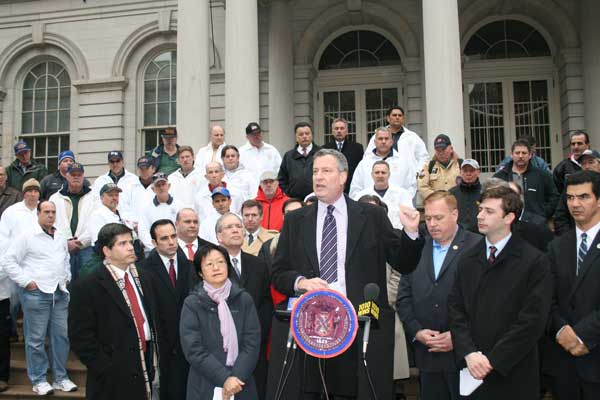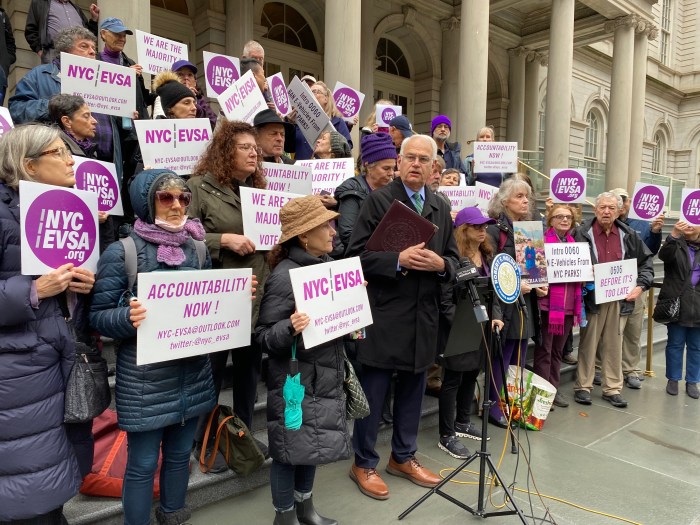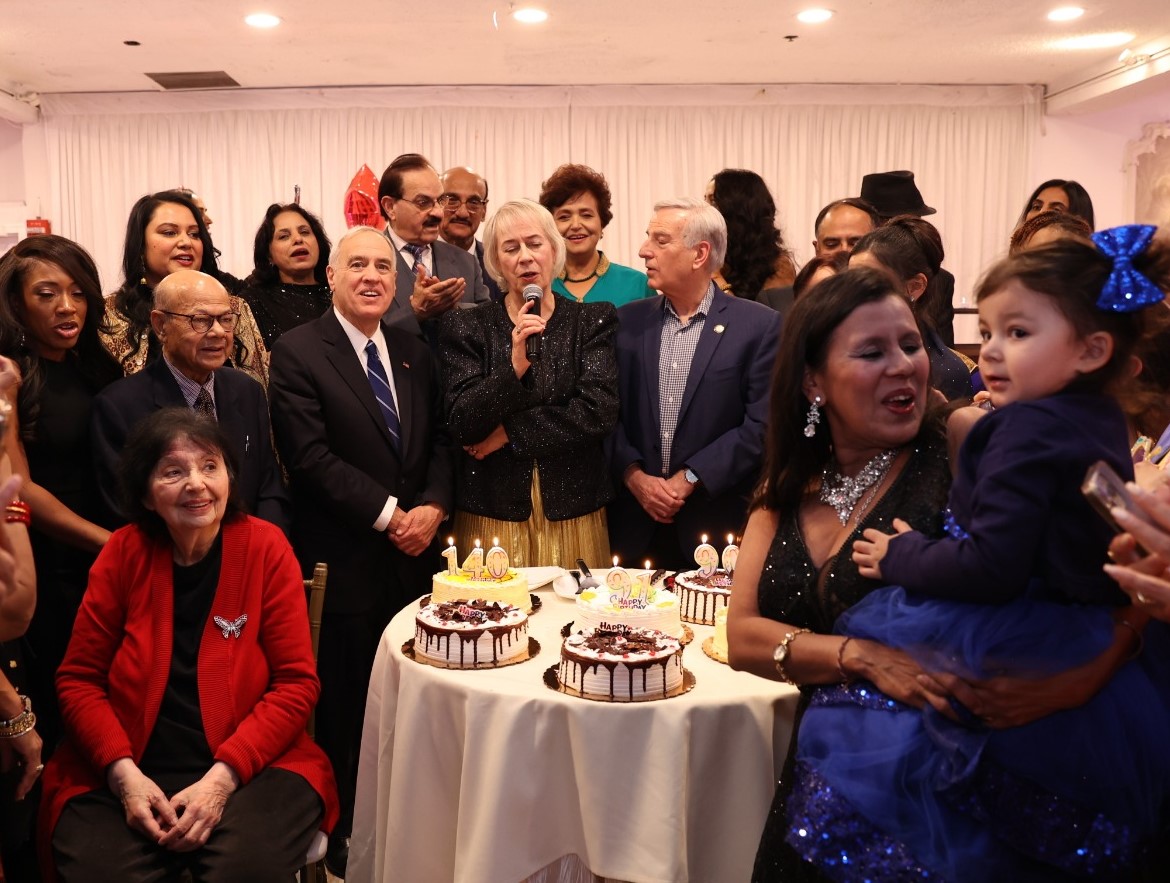 [/media-credit]
[/media-credit]
- NYC Public Advocate Bill de Blasio stood on the steps of City Hall last Wednesday at a rally calling for the city to release the names and medical information of NYPD officers that have been diagnosed with cancer following 9/11.
BY ALINE REYNOLDS | Forty-seven-year-old John Walcott never realized his dream of becoming a college hockey coach due to an incapacitating illness his doctors believe is tied to prolonged exposure to Ground Zero toxins.
Walcott, a former NYPD detective, was diagnosed with leukemia in May 2003, which he attributes to near-nonstop recovery work at Ground Zero for six straight months after the Sept. 11, 2001 terrorist attacks.
While Walcott is seen for other 9/11-related health problems at Mount Sinai Hospital’s World Trade Center Medical Monitoring and Treatment Program, the former cop must seek cancer treatment elsewhere using private health insurance, since the disease is not covered by the James L. Zadroga 9/11 Health and Compensation Act, the federal bill that subsidizes health care and compensation for select 9/11 illnesses.
“To me it’s a fifth [9/11] injury, but no one’s tracking it because it’s a non-recognizable injury,” said Walcott. “We know an unusually high number of early responders are diagnosed with cancer, yet no one seems particularly interested in trying to corroborate any of these findings.”
Walcott is one of many 9/11 first responder NYPD officers whose identities and medical information have been kept under lock and key by the city for years for reasons of confidentiality. But just last week, at the urging of worker’s union representatives and elected officials, Mayor Michael Bloomberg’s office agreed to release the cops’ names to Mt. Sinai, which would inform the hospital’s future studies on 9/11-related cancers. The studies, advocates say, could help persuade the government to add cancer to the Zadroga bill.
In a written statement issued Wednesday, Feb. 15, Deputy Mayor for Operations Cas Holloway said the city is now committed to sharing the information with Mt. Sinai as quickly as possible.
“Since federal and state laws prevent us from disclosing the names of those who have reported that they have cancer or other conditions without their permission,” said Holloway, “we are developing a process to ask all of those individuals if they will authorize the release of their names.”
Responding to Holloway’s statement, Mt. Sinai Spokesperson Ian Michaels said the hospital is “very pleased” to receive the information and plans to collaborate with the NYPD to transfer the names in a way that will comply with federal patient confidentiality laws.
Having the full list of cops’ names will enhance Mt. Sinai’s ongoing examination of the records of an estimated 20,000 patients that are currently enrolled in the hospital’s W.T.C. health program, Michaels added.
“This information will help our doctors to conduct analyses of patterns of cancer in 9/11 responders and to make informed decisions about the future care of these patients,” he said.
A spokesperson for the Mayor’s office declined to specify whether the city also has plans to disclose the police officers’ health records, whose release Public Advocate Bill de Blasio demanded for in his Feb. 13 letter to Bloomberg and NYPD Police Commissioner Raymond Kelly.
At a City Hall press conference held on the day of Holloway’s announcement, de Blasio expressed dissatisfaction with Holloway for not disclosing a more specific time frame for sharing the cops’ names with Mt. Sinai. “I appreciate their statement, but… it didn’t guarantee what we need to see,” said de Blasio. “To use a rock n’ roll quote from The Who, ‘We won’t get fooled again.’”
The Patrolmen’s Benevolent Association, the largest worker’s union representing NYPD officers, believes a law should be established obligating the city to release cancer-related information of 9/11 first responders.
The P.B.A.’s own research recently revealed that 297 first responder cops whose average age was a young 44 have been diagnosed with cancer since 9/11. According to the union, 56 of them have since died.
“It is our sincere opinion that the city has done nothing to facilitate any cancer study and has been actively working to prevent a comprehensive examination of the issue,” said P.B.A. Research Director Frank Tramontano during a City Council 9/11 Health hearing last month.
Following the city’s announcement, P.B.A. President Patrick Lynch said, “That we are over 10 years past the events of 9/11 and this data hasn’t yet been turned over, even though hundreds of responders are suffering with cancers, confirms that a legal mandate is required.”
Elected officials present at last week’s press conference backed the P.B.A.’s position, saying the city needs to do more to prove the link between cancer and Ground Zero exposure.
“In light of all we know and all of the heartbreaking stories we’ve heard, I find it staggering that the city has refused to recognize that responders exposed to cancer-causing toxin dust are dying because of it,” said Councilmember Margaret Chin. “Without [this and other] steps, the Zadroga Act will fail in its mission to help heal the heroes of 9/11.”
“The fact that we’re standing here more than 10 years out and are again fighting for good information and fighting against bureaucracy boggles the mind. Hopefully today marks the end of that,” said State Senator Daniel Squadron.
Squadron then turned to a group of first responders in attendance and said, “To everyone who came down and cleaned up the pile, to all those who lived right around the site, I want to promise you: Whether today is the end of this battle for fairness or just another step, we will be with you all the way, ‘till the end, until justice is served.”



































